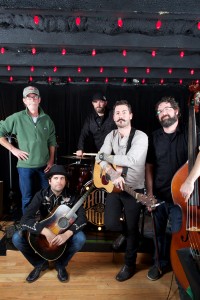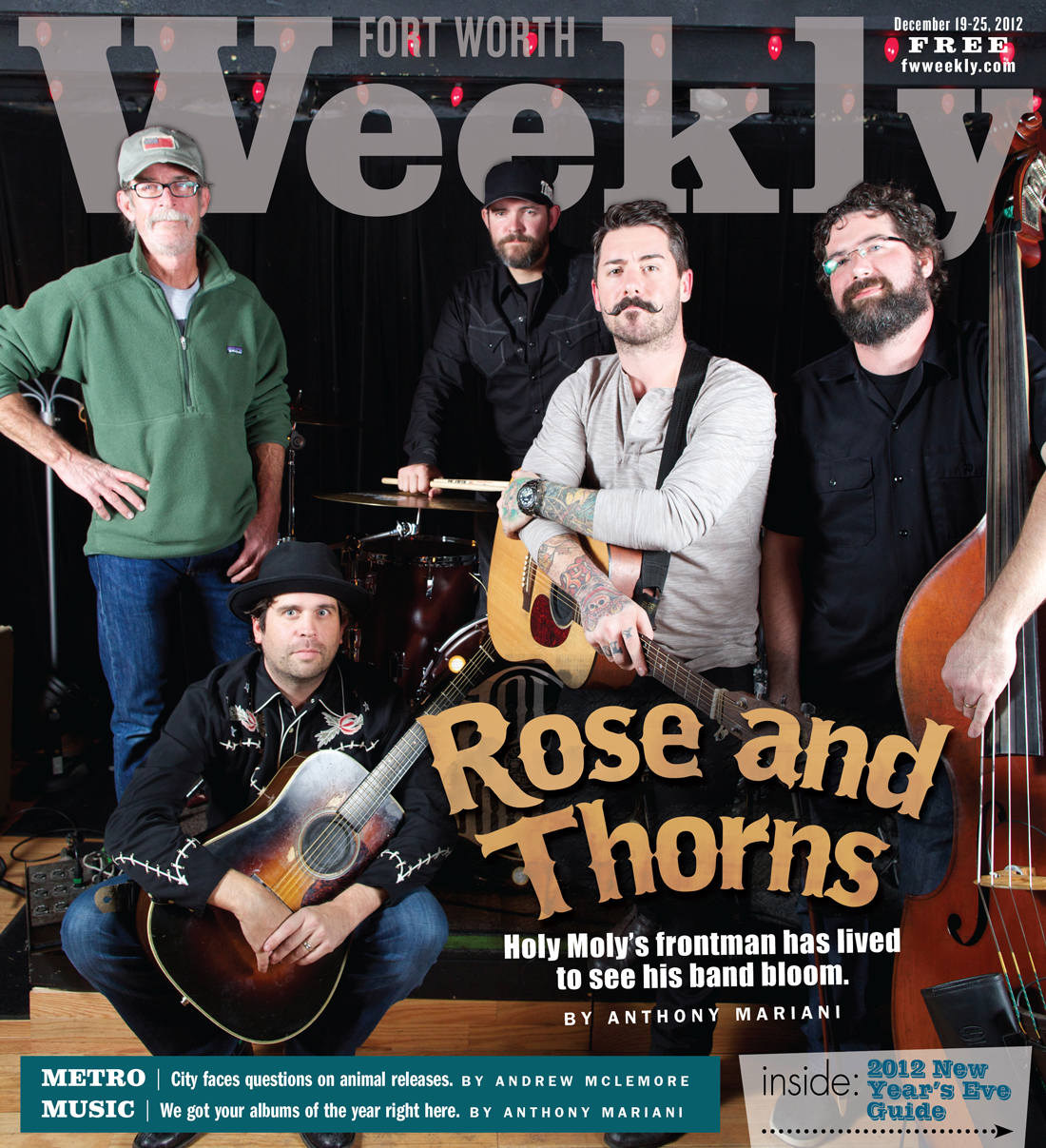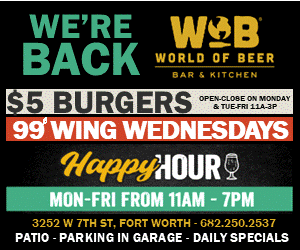Large bodies were bouncing off one another like bingo balls. In front of and slightly above them, Fort Worth acoustic country-punk quintet Holy Moly was wrapping up a set of sometimes subdued, often high-octane originals and the occasional obscure cover. The show was happening in Fort Worth but not at a place where you’d expect to see moshing. Not 1919 Hemphill. Not Lola’s Saloon. Not The Rail. No, Holy Moly was firing up the masses at Billy Bob’s Texas, a place better known for boot-scootin’ and line dancing than for maelstroms of tattooed knees and elbows.
Except for the occasional dinosaur-rock act (Styx, Ted Nugent), Billy Bob’s multiple stages are usually reserved for both kinds of music: country and Western. True, Holy Moly’s music is countrified and twangy, but the band has as much in common with Fugazi and The Dead Kennedys as with Willie and Waylon. The show was huge in a couple of ways. First, nearly 2,000 people showed up, enlivening the shadowy, sprawling room. Second, maybe Holy Moly has broken through some sort of glass ceiling. Maybe the band has proven that top-quality, underground, independent, non-C&W music can work at Billy Bob’s. The honkytonk makes a ton of money –– tickets were $10, and the drink prices were pretty steep –– and the bands that play there get to make some money and also get to say, “Hey. We played Billy Bob’s.”
Robert Gallagher, who’s been booking shows at Billy Bob’s for 25 years, said Holy Moly has always been on his radar. Knowing how well the band draws, Billy Bob’s president Concho Minick made room on a Thursday night. The band jumped at the opportunity and did not disappoint.
“Oh, my gosh,” Gallagher said. “It was one of the most diverse crowds I’ve ever seen on a Thursday. … I loved the music. I hadn’t listened to them in two or three years, and they’ve grown incredibly.”
The show also meant a lot to the heart and soul of Holy Moly. Frontman and lead songwriter Joe Rose wanted to thrill Billy Bob’s to prove that indie underground rockers have a place at the table at one of the most legendary institutions in the country. Chiefly courtesy of Holy Moly, Billy Bob’s is now considering opening the door to more underground local music.
“We met about it this morning,” Gallagher said. “There are a ton of great bands in Fort Worth, but … you’ve got to get that crowd support. Holy Moly did a great job of marketing.”
On a less rational note for Rose, a kickass show also meant smooth sailing for Brazos. Rose and wife Hannah are pregnant with their second child, a boy named after the legendary river, and are due in February –– their first child, 4-year-old Edith, a.k.a. Ede Faye, is from Hannah’s first marriage, and last July, the couple lost a child, Scarlet Jolene Rose. “It was a hard time,” Rose recalled. “The guilt is tough to deal with. You want to push away from somebody at that point, run in the opposite direction, start over, disappear, forget it ever happened.”
Rose is one of the most talented frontmen and singer-songwriters in North Texas, and with his rugged good looks and trademark handlebar mustache he’s also a charismatic presence onstage. Even without the Billy Bob’s show, his band remains one of the biggest draws in North Texas, regularly packing the 450-people-capacity Aardvark (owned by Danny Weaver, who shares Holy Moly songwriting duties with Rose), other regional clubs, and even some small but crazy joints in Europe.
With Weaver on lead guitar, drummer Joe Carpenter, upright bassist Jeremy Hull, and newcomer Ben Roi Herring on pedal steel guitar, Holy Moly is pretty sui generis: raucous and rowdy but also intelligently humorous (despite some cringe-worthy sexism) and deeply emotional. The songs to drink and sing along to are always tempered by moments of powerful feeling, driven by the Southern-fried but unaffected instrumentation and Rose’s smart, heartfelt lyrics.
Rose hasn’t peaked yet –– he’s only in his early 30s –– but he has lived a hundred classic C&W songs’ worth of life, mainly the rough spots brought on by the poor decisions he’s made and also by dreadful circumstances beyond his control. Music has not always been in his life, but it’s been important. “I know it sounds cliché,” he said over beers recently at Fred’s Texas Café. “But music really did save my life.”
Music eventually saved his life. It was not there for him all of the time. Not long after he started his first band, The Action, with Weaver in the early ’00s, Rose partied himself into a manic episode that deposited him at death’s door. Music also was not there when young Joe ended up homeless and reeking on the streets of Atlanta, Ga., weighing about 110 pounds, and scrounging for his next heroin fix or pill to pop.
Music saved his life but only after he could have died. A couple of times.
********
Rose’s upbringing went from idyllic to horrific quickly.
 Born in Arlington, he moved when he was just a kid with his family –– Mom, Dad, and older brother Johncary –– to Burleson, where Mom’s extended family lived. “We were really well off,” Rose said, adding that his grandfather owned an extremely successful land-title business in the area. But when Rose was around 12 years old, his grandfather declared bankruptcy. “That’s when the drama started,” Rose said.
Born in Arlington, he moved when he was just a kid with his family –– Mom, Dad, and older brother Johncary –– to Burleson, where Mom’s extended family lived. “We were really well off,” Rose said, adding that his grandfather owned an extremely successful land-title business in the area. But when Rose was around 12 years old, his grandfather declared bankruptcy. “That’s when the drama started,” Rose said.
A couple of years later, Rose’s beloved mother Rebecca Lynn died from a blood clot that traveled from her leg to her heart. “My dad didn’t handle it too well,” Rose recalled. “He just went into the bottle,” not providing any income or help.
Rose’s father wanted to move back to Arlington, where Joe’s paternal grandparents lived, but the boy refused. “I had just started getting friends, and I didn’t want to change everything in my life after the biggest thing in my life had just changed,” Rose recalled.
A loner by nature, Joe spent a lot of time writing and drawing in his bedroom. “I started writing as a kid just because I didn’t have anybody to talk to,” Rose said.
Often scribbling by the dim light of a tiny fluorescent bulb, he filled up notebook after notebook with his poetry/lyrics and ideas.
Sometimes, though, he just sat there with the lights off, despite his fear of the dark. “When I reached my teenage years, I realized I had to face those fears to get rid of them,” he remembered.
Music was mostly peripheral in the Rose household. All that Joe heard growing up was incidental classic radio country and saccharine crooners (Conway Twitty, George Jones, Engelbert Humperdinck). To insulate himself, Joe picked up a guitar, a ’60s-era Venture. His dad, as a teenager, had spent an entire summer mowing lawns to buy the thing but never learned to play it. The electric hollow body had been unused for years when Joe got his hands on it and began plinking and plucking.
“The guitar allowed me to be alone, and it didn’t seem weird that I was alone,” Rose recalled. “I just tried to seem like I was doing normal things, but, honestly, the only people I connected with were the people doing a lot of drugs.”
After a horrible experience smoking grapevine –– “it gave me bronchitis for two weeks” –– he dived straight into LSD. Music remained a sidelight. “The more drugs I did,” Rose said, “the more weird [music] I got into,” including proto-punks Ween and heavy guitar-prog-rockers Primus. “I was a fan of music. I didn’t play.”
Small-town Burleson, with its clean-cut, Christian image and chain restaurants and retailers, was rife with drugs, Rose said, especially meth. Getting hold of acid was a cinch.
For years, Rose harbored resentment toward his father. “I was pretty pissed at my dad at the time,” Rose said. “He kind of dropped the ball on me serious. He coped the way he had to, but unfortunately for me it wasn’t what I needed at the time. … He made me make decisions about life that I probably shouldn’t have been thinking about at that age. Who the hell thinks about a mortgage at 14 years old?!”
One of Rose’s worst –– and best –– memories starts with a knock on the door one afternoon during that period. He’d just made himself dinner and was sitting in the living room with his father “passed out in his chair,” Rose recalled, when the knock came. “It was this guy with this clipboard,” Rose remembered. “He was, like, ‘What are you doing here?’ I said, ‘What do you mean? This is my house.’ ‘No, no, no. It’s been foreclosed on. Y’all aren’t supposed to be here anymore.’ He goes, ‘I need you to leave now.’ ”
Rose’s father called his brother, Joe’s uncle, who arrived immediately with a flatbed trailer. While rushing to load it, Joe scampered to the attic and scanned the space for any valuables. What he found ended up becoming the only material possession that he says he will never part with. “It’s the most important thing to me,” he said. “It’s a picture of me, my brother, and my mom. … I flipped it over, and she wrote a letter on it in 1981. When we got that picture taken, I was only three. … I found that a year after she died, when I needed it the most. I mean, it was a pretty intense thing.”
In the letter, Rebecca Lynn explains Joe’s importance to her. “She says that even though I’ll grow up someday and have my own family, I’m always going to be her baby boy,” Rose said.
Joe’s aunt and grandmother offered to take him in, but they lived outside of Burleson, away from the comfort provided by Joe’s high school friends. To stay in Burleson and to stay afloat, Joe began working three jobs: busing tables and washing dishes at a tea room, chopping beef at a barbecue joint, and serving food to senior citizens at Huguley Hospital. (“It was the worst,” Rose said. “People complained to me, ‘This is the worst food. Why are you trying to kill me?!’ ”) Johncary had just moved out to attend hair-cutting school.
Joe’s father was of little to no use: “I found out a couple years later that I’d been getting Social Security [payments] the whole time,” Rose said. “I never knew it. My dad was using it. I was picking him up at least a couple times a month off the side of the road, from jail. It was pretty crazy.”
As soon as Joe laid hands on his high school diploma, he bolted. “I just wanted to get out of Burleson,” he said. “I wanted to get away from my dad.”
Joe’s father got his wish and went to live with his parents in Arlington.
Joe moved to Arlington too (but not with his father) and landed a 9-to-5 driving a forklift for a sporting goods company. One day, a friend appeared. Joe hadn’t seen him in years. The friend said he was living in Atlanta, not thriving by any stretch, just living. Joe cashed his paycheck, packed a backpack, and hopped into his buddy’s truck. “I was gone,” Rose said.
Neither of them had a place to stay. They squatted in a series of houses. Music? Writing? Didn’t matter to Joe. Any hole or void in his life was quickly filled by drugs.
“I had utter freedom,” Rose said. “I wasn’t worried about money. You didn’t need it. We had found ways of finding food. We always had enough money to buy our next fix, our next hit, our next fun time.”
But the fun didn’t last long. Rose eventually reached “a point of no return,” he said. “I realized I was fucked up. I needed to get out, or I was going to die. I realized that I had pushed it too far, and I just started walking.”
Joe’s feet took him miles away, to Hartsfield-Jackson Atlanta International Airport.
And salvation.
********













Excellent story! Very informative and well-written.
Thank you, Stacey.